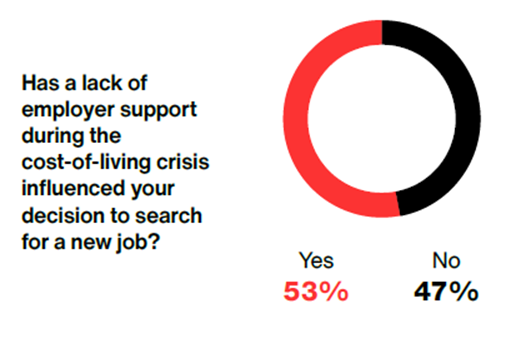Quick CV Dropoff
Send us your CV

Remuneration is and always will be a paramount concern for jobseekers and employees, and over the past year or so, this has been magnified by the cost-of-living crisis as inflation and skyrocketing bills have put many under greater financial pressure.
Our research found that employees feel as though their employers have not shown them enough support during the cost-of-living crisis. 53% of individuals said they felt their employers could have done more during this time.
Employers have an essential role to play in supporting their employees however, the good news is implementing support schemes that are not strictly monetary can make a difference to employees. When asked, employees said that culture/ working environment was the most important to them beyond remuneration, followed by flexibility. Offering additional perks and benefits like these are crucial in creating a supportive and engaging workplace. Flexible working arrangements, mental health support, career development opportunities, and other non-financial benefits can greatly improve employee satisfaction and well-being. These measures show that employers care about their employees' well-being as a whole.

Ben Harrison, director of the Work Foundation at Lancaster University, said: “Employers have a crucial role in supporting their workers through the cost-of-living crisis. Even if we see inflation halve, the impact of rising prices will last long into the future.”
“It’s vital that business leaders engage with their workforce to understand the challenges their employees face and put proper financial wellbeing strategies in place. Ensuring pay levels rise as close to inflation as possible is key, but if businesses find themselves unable to afford such an uplift, there are lots of other ways they can offer support.”
Often roles with high demand or specialised skills often see more proactive salary reviews. In contrast, positions with a higher supply of candidates may experience slower salary growth. Our role-specific insights provide valuable guidance for employers looking to benchmark their salary offerings accurately.
Another thing to consider is how important transparent communication is when it comes to remuneration. It’s no surprised to hear that employees appreciate when their employer openly discusses salary structures, pay raises, and the rationale behind compensation decisions.
Companies can implement five actionable strategies to implement transparency:
This transparency cultivates trust and can significantly enhance employee loyalty and morale.
In light of these insights, it’s clear that remuneration is not just a number on a pay cheque but a key aspect of the employee-employer relationship. Addressing remuneration concerns proactively can lead to a more motivated, loyal, and productive workforce.
To ensure your organisation remains competitive and is fair in its remuneration practices, our 2024 Life Sciences Salary Guide benchmarks salaries against the market rate to help you make informed decisions that will attract and retain top talent.